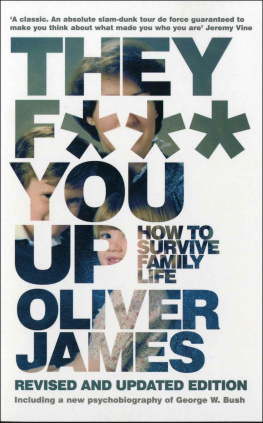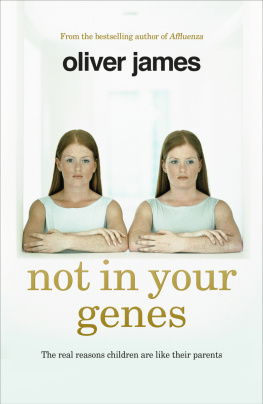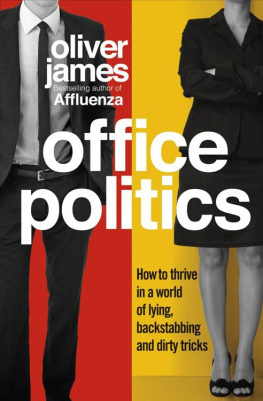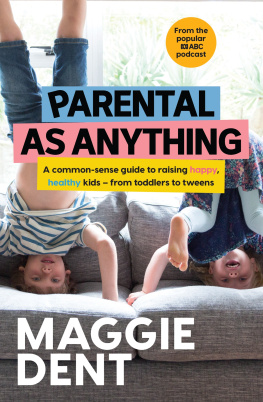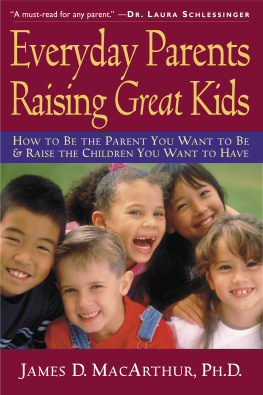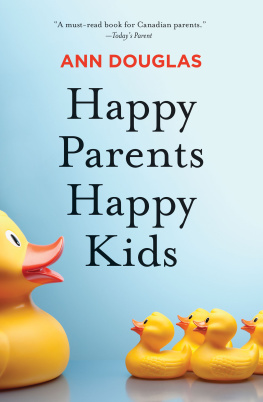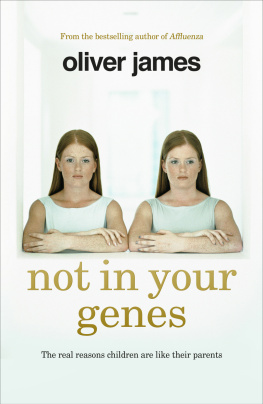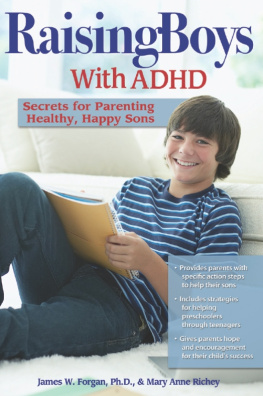The First Three Years
OLIVER JAMES

This eBook is copyright material and must not be copied, reproduced, transferred, distributed, leased, licensed or publicly performed or used in any way except as specifically permitted in writing by the publishers, as allowed under the terms and conditions under which it was purchased or as strictly permitted by applicable copyright law. Any unauthorised distribution or use of this text may be a direct infringement of the authors and publishers rights and those responsible may be liable in law accordingly.
Version 1.0
Epub ISBN 9781407080093
www.randomhouse.co.uk
1 3 5 7 9 10 8 6 4 2
Published in 2010 by Vermilion, an imprint of Ebury Publishing
Ebury Publishing is a Random House Group company
Copyright Oliver James 2010
Oliver James has asserted his right to be identified as the author of this work in accordance with the Copyright, Designs and Patents Act 1988.
All rights reserved. No part of this publication may be reproduced, stored in a retrieval system, or transmitted in any form or by any means, electronic, mechanical, photocopying, recording or otherwise, without the prior permission of the copyright owner.
The Random House Group Limited Reg. No. 954009
Addresses for companies within the Random House Group can be found at www.rbooks.co.uk
A CIP catalogue record for this book is available from the British Library
The Random House Group Limited supports The Forest Stewardship Council (FSC), the leading international forest certification organisation. All our titles that are printed on Greenpeace approved FSC certified paper carry the FSC logo. Our paper procurement policy can be found at www.rbooks.co.uk/environment
Printed and bound in Great Britain by Clays Ltd, St Ives Plc
Hardback ISBN 9780091923914 Trade paperback ISBN 9780091923921
Copies are available at special rates for bulk orders. Contact the sales development team on 020 7840 8487 for more information.
To buy books by your favourite authors and register for offers, visit www.rbooks.co.uk
This book is a work of non-fiction. The names of people in the case studies have been changed solely to protect the privacy of others.
Contents
To Olive and Louis
This be the Verse
They fuck you up, your mum and dad.
They may not mean to, but they do.
They fill you with the faults they had
And add some extra, just for you.
But they were fucked up in their turn
By fools in old-style hats and coats,
Who half the time were soppy-stern
And half at one anothers throats.
Man hands on misery to man.
It deepens like a coastal shelf.
Get out as early as you can,
And dont have any kids yourself.
Philip Larkin
This be Another Verse
They tuck you up, your mum and dad,
With heartfelt, steadfast, loving coos.
They fill you with the strengths they have,
And wipe the never-ending poos.
But they were tucked up in their turn
Spock flowing from permissive throats,
As mummies stuck it out at home
And daddies grafted hard for groats.
Woman hands on mental health to Man.
She puts her self upon the shelf
Or looks for someone else who can
Tune in to babys needy self.
Oliver James
Introduction
When I was three months old, in 1953, my mother regularly parked me in a pram at the end of the garden. Relatives tell me that I was sometimes left unattended there, crying for long periods. I can believe this is true because my mum was hard-pressed. I was the third of four children and by the time my younger sister was born, there were four of us under the age of five: a big burden for any mother.
Although I cannot directly remember much, I believe that things did not improve when I started toddling. While my mum was probably pleased to have a son all my siblings being female I doubt this enabled her to be very responsive. I suspect she was mildly depressed for most of the time and I am sure that she was both tired and irritable. She was an erratic provider of discipline, frequently resorting to clips around the ear-hole. While my dad was an exceptionally maternal parent for a man of that era, and while he did work from home, he can only have been much in evidence during the evenings and weekends.
My most vivid early impressions are of my mothers drawn face with down-turned mouth. She would slump at the kitchen table, exhausted, and her mood was one of resignation, with an undertow of anger. The main moments of emotional relief were provided by her packet of Gold Leaf cigarettes. From the first inhalation, she would become animated, ). For the duration of the cigarette, a light would be switched on, only to fade and die as the next set of burdens confronted her.
After a successful career as a psychiatric social worker, my mum qualified as a psychoanalyst. She was well thought of in that Woody Allen world, before she gave up work in her mid-thirties to care for her children. Her modern-day equivalent would probably have hired a nanny and continued with her career. So, I start with these reminiscences to raise two questions: how, if at all, did this early care affect what kind of person I became? Would I, as well as my mum, have been better off if she had returned to work?
In answer to the first question, I shall be brief, since I doubt you are seeking my autobiography.
I believe that my early infantile deprivation (the first six months) left me with a rather weak sense of self, meaning that I was unsure of what I really felt, liable to become disconnected and distanced, prone to second-hand living (like writing books about other peoples psychology).
I also believe that my mothers unresponsiveness and irritability when I was a toddler made me emotionally insecure. Anyone who was there will tell you I was often surly, aggressive and what is technically known as avoidant. Having felt rejected by my mum, I feared rejection in relationships, expecting others to be hostile or neglectful. As an avoidant boy, I would get my rejection in first, liable to hit other children or to give them the cold shoulder, making the assumption that they would do this to me if given a chance.
These observations about myself are strongly supported by buckets of evidence. Many studies of infants and toddlers, presented in Chapters 4 and 5 of my book They F*** You Up, show that if no one much tunes into you and is responsive when you are an infant, you build up less of a sense of self.
So the first point I want to make is that it really does matter enormously how you care for under-threes.
Writing this, I can picture the tsunami of apprehension sweeping over the reader. Perhaps you are pregnant with your first child. Perhaps you already have three. The danger is that your response to yet another person a male expert at that (I am a child clinical psychologist and father of two) warning that the early years are so formative is a terrible sense of foreboding about becoming a mother, or anxiety that you have already screwed up your child, perhaps soon followed by a sense of outrage. Well, let me put your mind at rest, right away.
What I hope to do in this book is to explain that the actual practicalities of the meeting of the needs of under-threes are not the problem. By this I do not mean it is a piece of cake or that the work is anything other than back-breaking, repetitive and incredibly demanding, emotionally, intellectually and physically. What I mean is that, when you stop to think about it, most people can change a nappy, or pick up a crying baby, or warm up milk for a bottle. The physical steps entailed, in themselves, are easy. The difficult bit is knowing which steps to take, when, and how to execute them on a particular occasion.


